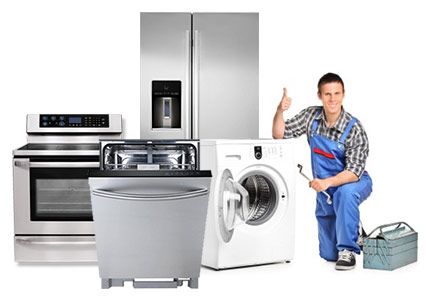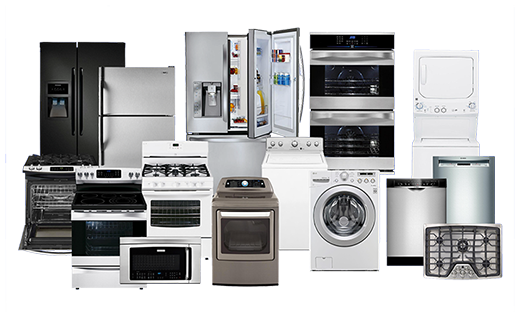The Ultimate Overview to Recognizing Appliance Repair at Home
When your fridge quits cooling down or your stove rejects to warmth, it can feel overwhelming. Comprehending appliance repair service at home can conserve you time and money. You'll learn to acknowledge signs, utilize essential devices, and adhere to an organized troubleshooting procedure. Before you start, there are vital safety and security preventative measures you require to take right into account. What are one of the most typical problems, and how can you fix them? Let's check out the basics.
Typical Appliance Problems and Their Symptoms
When your appliances begin breaking down, it's vital to recognize the indicators early. Ignoring them can bring about bigger issues and costly repair work. For example, if your fridge isn't cooling effectively, you could discover warm areas or condensation forming. This might show a stopping working compressor or a blocked vent.Your dishwashing machine may show issues through unclean meals or unusual sounds during cycles. If you listen to grinding or clanking, it's time to investigate.A cleaning equipment that won't spin or drain pipes can leave you with soaked laundry, suggesting a clogged drain or a malfunctioning pump.Lastly, if your oven's temperature seems off or it takes permanently to preheat, you may be taking care of a damaged thermostat. By staying sharp to these symptoms, you can deal with problems before they intensify into major repair work.
Essential Devices for Device Repair Work
When you're tackling home appliance repair services in the house, having the right tools is important. Standard hand devices like screwdrivers and pliers will certainly assist you take apart and fix numerous devices, while electric testing tools assure you're functioning safely with wiring. Let's go over what you require to get going on your repair trip.
Fundamental Hand Tools
Having the right devices is necessary for reliable device repair service at home. Start with a trustworthy screwdriver set, including both flathead and Phillips kinds, as screws are common in home appliance setting up. Pliers are likewise important; they assist with gripping, twisting, and reducing cords or little components. A set of needle-nose pliers can get to tight areas quickly. You'll need a good adjustable wrench for tightening up or loosening up nuts and screws. An utility blade is helpful for puncturing product packaging or insulation. Don't forget a sturdy workbench or surface to securely arrange your devices and components. With these basic hand devices, you'll be well-prepared to take on most home appliance fixings that come your means.
Electrical Screening Devices
Along with fundamental hand devices, electric screening tools play an essential function in device repair work. These devices assist you detect electrical problems and assurance appliances operate safely. A multimeter is crucial; it measures voltage, existing, and resistance, permitting you to pinpoint troubles promptly. A non-contact voltage tester is one more essential, allowing you detect real-time wires without making direct get in touch with, boosting your safety and security. Clamp meters are great for measuring present circulation in cables without detaching them, conserving you effort and time. Furthermore, circuit testers can quickly inspect if outlets are working effectively. By making use of these tools, you'll simplify your troubleshooting procedure and improve your repair skills, making appliance maintenance a great deal easier.
Step-by-Step Overview to Diagnosing Appliance Issues
When your appliance breaks down, it can be irritating, yet detecting the problem does not need to be frustrating. You'll discover to identify typical issues and apply effective repairing methods. Allow's go through the actions to obtain your device back in functioning order.
Usual Device Issues

Fixing Techniques Clarified

Fixing Significant Cooking Area Appliances: A Closer Look
Have you ever before asked yourself exactly how to deal with typical problems with your kitchen appliances? Fixing major kitchen area devices like fridges, stoves, and dishwashers can be less complicated than you believe. Begin by recognizing the problem-- whether it's a refrigerator not cooling down or an oven that will not heat. Frequently, a simple reset or checking the source of power can address the issue.For fridges, tidy the condenser coils and examine the door seals. If your oven's not home heating, inspect the heating aspect and thermostat. Dish washers could simply need a tidy filter or a reset to get them back in activity. Constantly disconnect the home appliance prior to diving right into repair work to guarantee your safety.Don' t forget to speak with the customer guidebook for particular repairing ideas related to your version. With a little bit of patience and the right devices, you can with confidence take on appliance fixings and conserve cash while doing so!

Fixing Laundry Equipments: Tips and Techniques
When your laundry appliances begin acting up, it can really feel frustrating, but fixing them doesn't need to be a problem. Beginning by checking the power supply. Verify the home appliance is connected in and the electrical outlet is operating. Next, evaluate the door or cover switch; a malfunctioning button can protect against the equipment from operating.For washing machines, if it's not rotating, look for unbalanced tons. Redistributing the clothes could fix the issue. If your clothes dryer isn't heating, tidy the dust filter and examine the air vent for blockages.Listen for uncommon noises; they can suggest a problem. If your device is dripping, check the hoses for splits or loosened links. Record any error codes displayed on electronic screens, as they can direct you in identifying the issue. Ultimately, consult the user manual for specific repairing tips connected to your design.
Safety And Security Preventative Measures to Take During Fixes
Prior to you start any kind of home appliance repair work, it's important to prioritize safety to avoid accidents or injuries. Unplug the appliance or turn off the circuit breaker to assure no power reaches it while you function. Use insulated tools to reduce the risk of electric shock. Use security goggles and handwear covers to secure yourself from sharp read review edges or debris (Dependable Refrigeration & Appliance Repair Service Washer repair near me).Make particular your work space is tidy and well-lit, so you can see what you're doing. Keep children and animals away from the area to prevent diversions and prospective hazards. If you're dealing with gas home appliances, be extra careful; check for leaks before proceeding.Take your time, and do not rush with repair work. If you feel unsure regarding any kind of action, it's far better to pause and study than to think. Complying with these preventative measures will certainly assist develop a safer setting for your DIY appliance fixing task
When to Call a Professional for Help
How do you know if it's time to call in a specialist for device repairs? If you've attempted fundamental troubleshooting without success, it's a clear sign. If your home appliance still won't start or reveals uncommon noises after resetting it, don't hesitate to look for expert help.When you discover leaks, smoke, or burning scents, prioritize safety and security and call a pro quickly. Going Here These concerns can bring about more considerable damage or pose dangers to your home.Also, if your appliance is under guarantee, getting in touch with an expert is commonly the finest path. They can ensure that repairs will not invalidate your service warranty, conserving you cash in the lengthy run.Finally, if you're uncertain or unpleasant with complicated repair work, it's smart to leave it to the experts. Keep in mind, dealing with complicated issues without the right proficiency can bring about expensive mistakes. Count on an expert when in doubt!
Often Asked Questions
Just How Can I Avoid Appliance Troubles in the Future?
To avoid appliance problems in the future, you must do normal upkeep, look for damage, tidy filters, and avoid overloading. Remaining positive will aid extend their lifespan and maintain them running efficiently.
What Are the Most Common Do It Yourself Appliance Repair Mistakes?
You might forget safety and security precautions, miss fixing actions, or utilize wrong tools when attempting DIY appliance fixings. Hurrying the procedure or overlooking producer guidelines can lead to even more substantial problems and pricey blunders. Remain client and notified!
Just how Do I Know if a Component Demands Replacement?
You can inform if a component requires substitute by looking for uncommon noises, leakages, or irregular performance. If the home appliance battles to run properly or shows visible damage, it's likely time for a replacement.
Can I Utilize Generic Components for Home Appliance Fixes?
Yes, you can make use of generic parts for appliance repairs, but identify they work - Fixes washers and dryers Oro valley Dependable Appliance Repair. Generic components could save you cash, but they can influence performance or durability, so consider your choices meticulously prior to deciding
What Guarantees Cover Appliance Repair Works?
Many home appliance warranties cover repairs for manufacturing defects, however they commonly omit damage from misuse. Examine your warranty terms very carefully, as some may require utilizing qualified specialists and initial parts for coverage to remain valid.